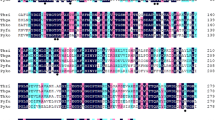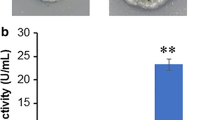Abstract
In recent times, L-asparaginase has emerged as a potential anti-carcinogen through hydrolysis of L-asparagine in the blood for anti-leukemic application, and in carbohydrate-based foods, for acrylamide reduction applications. In this study, Aspergillus sydowii strain UCCM 00124 produced an L-asparaginase with a baseline acrylamide reduction potential of 64.5% in sweet potato chips. Plasma mutagenesis at atmospheric pressure and room temperature (ARTP) was employed to improve L-asparaginase production while artificial neural network embedded with genetic algorithm (ANN-GA) and global sensitivity analysis were used to identify and optimize process conditions for improved acrylamide reduction in sweet potato chips. The ARTP mutagenesis generated a valine-deficient mutant, Val-Asp-S-180-L with 2.5-fold L-asparaginase improvement. The ANN-GA hybrid evolutionary intelligence significantly improved process efficiency to 98.18% under optimized conditions set as 118.6 °C, 726.37 g/L asparagine content, 9.92 µg/mL L-asparaginase, 4.54% NaCl, and soaking time of 15 h without significant changes in sensory properties. The sensitivity index revealed initial asparagine content as the most sensitive parameter to the bioprocess. The enzyme demonstrated significant thermo-stability with Arrhenius deactivation rate constant, Kd, of 0.00562 min−1 and half-life, t1/2, of 123.35 min at 338 K. These conditions are recommended for sustainable healthier, and safer sweet potato chips processing in the food industry.




Similar content being viewed by others
Data availability
Data generated in this study are provided in the main manuscript and Supplementary material. Additional data may be provided upon reasonable request by the corresponding author.
Code availability
Not applicable.
References
Amenaghawon AN, Orukpe PI, Nwanbi-Victor J, Okedi MO, Aburime EI (2022) Enhanced lipase production from a ternary substrate mix of agricultural residues: a case of optimization of microbial inducers and global sensitivity analysis. Bioresour Technol Rep. https://doi.org/10.1016/j.biteb.2022.101000
Asitok AD, Ekpenyong MG, Takon IA, Antai SP, Ogarekpe NM, Antigha RE, Edet, PE, Ben UC, Akpan AE, Antai AS, Essien JP (2022a) Overproduction of a thermo-stable halo-alkaline protease on agro-waste-based optimized medium through alternate combinatorial random mutagenesis of Stenotrophomonas acidaminiphila. Biotechnol Rep 35:e00746. https://doi.org/10.1016/j.btre.2022.e00746.
Asitok AD, Ekpenyong MG, Ogarekpe NM, Antigha RE, Takon IA, Rao AP, Iheanacho JN, Antai SP (2022b) Intracellular-to-extracellular localization switch of acidic lipase in Enterobacter cloacae through multi-objective medium optimization: aqueous two-phase purification and activity kinetics. World J Microbiol Biotechnol 38:235. https://doi.org/10.1007/s11274-022-03429-8.
Bradford M (1976) A rapid and sensitive method for quantitation of microgram quantities of protein utilizing the principle of protein-dye binding. Anal Biochem 72:248–254. https://doi.org/10.1016/0003-2697(76)90527-3.
Chi H, Chen M, Jiao L, Lu Z, Bie X, Zhao H, Lu F (2021) Characterization of a novel L-asparaginase from Mycobacterium gordonae with acrylamide mitigation potential. Foods 10:2819. https://doi.org/10.3390/foods10112819.
Ekpenyong MG, Asitok AD, Antai SP, Ekpo BO, Antigha RE, Ogarekpe NM (2021a) Statistical and artificial neural network approaches to modeling and optimization of fermentation conditions for production of a surface/bioactive glyco-lipo-peptide. Int J Pept Res Ther 27:475–495, https://doi.org/10.1007/s10989-020-10094-8.
Ekpenyong MG, Asitok AD, Antigha RE, Ogarekpe NM, Ekong US, Asuquo MI, Essien JP, Antai, SP (2021b) Bioprocess optimization of nutritional parameters for enhanced anti-leukemic L-asparaginase production by Aspergillus candidus UCCM 00117: a sequential statistical approach. Int J Pept Res Ther 27:1501–1527. https://doi.org/10.1007/s10989-021-10188-x.
El-Naggar NE, Deraz SF, El-Ewasy SM, Suddek GM (2018) Purification, characterization and immunogenicity assessment of glutaminase free L-asparaginase from Streptomyces brollosae NEAE-115. BMC Pharmacol Toxicol 19:51–65. https://doi.org/10.1186/s40360-018-0242-1.
Gulati R, Saxena RK, Gupta R (1997) A rapid plate assay for screening L-asparaginase producing micro-organisms. Lett Appl Microbiol 24:23–26. https://doi.org/10.1046/j.1472-765x.1997.00331.x.
Holliday R (1956) A new method for the identification of biochemical mutants of microorganisms. Nature 178:987. https://doi.org/10.1038/178987a0.
Imada A, Igarasi S, Nakahama K, Isono M (1973) Asparaginase and glutaminase activities of microorganisms. J Gen Microbiol 76:85–99. https://doi.org/10.1099/00221287-76-1-85.
Jung H-J, Ko E-J, Kwak H-S (2013) Comparison of physicochemical and sensory properties between cholesterol-removed Gouda cheese and gouda cheese during ripening. Asian Australas J Anim Sci 26:1773–1780. https://doi.org/10.5713/ajas.2013.13255.
Khalil NM, Rodríguez-Couto S, El-Ghany MNA (2021) Characterization of Penicillium crustosum L-asparaginase and its acrylamide alleviation efficiency in roasted coffee beans at non-cytotoxic levels. Arch Microbiol 203:2625–2637. https://doi.org/10.1007/s00203-021-02198-6.
Krause FS, Blombach B, Eikmanns BJ (2010) Metabolic engineering of Corynebacterium glutamicum for 2-ketoisovalerate production. Appl Environ Microbiol 76:8053–8061. https://doi.org/10.1128/AEM.01710-10.
Laemmli UK (1970) Cleavage of structural protein during the assembly of the head 385 of bacteriophage T4. Nature 227:680–685. https://doi.org/10.1038/227680a0.
Lingnert H, Grivas S, Jägerstad M, Skog K, Törnqvist M, Åman P (2002) Acrylamide in food: mechanisms of formation and influencing factors during heating of foods. Scandinavian J Nutr, 46:159–172. https://doi.org/10.1080/110264802762225273.
Liyanage DWK, Yevtushenko DP, Konschuh M, Bizimungu B, Lu Z-X (2021) Processing strategies to decrease acrylamide formation, reducing sugars and free asparagine content in potato chips from three commercial cultivars. Food Control 119:107452. https://doi.org/10.1016/j.foodcont.2020.107452.
Mormann S, Lömker A, Rückert C, Gaigalat L, Tauch A, Pühler A, Kalinowski J (2006) Random mutagenesis in Corynebacterium glutamicum ATCC 13032 using an IS6100-based transposon vector identified the last unknown gene in the histidine biosynthesis pathway. BMC Genomics 7:205–224. https://doi.org/10.1186/1471-2164-7-205.
Munir N, Zia MA, Sharif S, Tahir IM, Jahangeer M, Javed I, Riaz M, Sarwar MU, Akram M, Shah SMA (2019) L-asparaginase potential in acrylamide mitigation from foodstuff: a mini-review. Progress in Nutrition 21:498–506. https://doi.org/10.23752/pn.v21i3.6771.
Muttucumaru N, Powers SJ, Elmore JS, Dodson A, Briddon A, Mottram DS, Halford NG (2017) Acrylamide-forming potential of potatoes grown at different locations, and the ratio of free asparagine to reducing sugars at which free asparagine becomes a limiting factor for acrylamide formation. Food Chem 220:76–86. https://doi.org/10.1016/j.foodchem.2016.09.199.
Negoita M, Mihai AL, Hornet GA (2022) Influence of water, NaCl and citric acid soaking pre-treatments on acrylamide content in french fries prepared in domestic conditions. Foods 11:1204. https://doi.org/10.3390/foods11091204.
Nematollahi A, Meybody NM, Khaneghah AM (2021) An overview of the combination of emerging technologies with conventional methods to reduce acrylamide in different food products: perspectives and future challenges. Food Control 127:108144. https://doi.org/10.1016/j.foodcont.2021.108144.
Shu L, Si X, Yang X, Ma W, Sun J, Zhang J, Xue X, Wang D, Gao Q (2020) Enhancement of acid protease activity of aspergillus oryzae using atmospheric and room temperature plasma. Front Microbiol 11:1418. https://doi.org/10.3389/fmicb.2020.01418.
Teuschler L, Gasperl A, Remele K, Pfeifhofer HW, Müller M (2021) Asparagine content is a key factor for acrylamide formation in sweet potato (Ipomoea batatas L.) fries. J Agric Food Dev 7:16–24. https://doi.org/10.30635/2415-0142.2021.07.04.
Wang Y, Xu W, Wu H, Zhang W, Guang C, Mu W (2021) Microbial production, molecular modification, and practical application of L-asparaginase: a review. Int J Biol Macromol 186:975–983. https://doi.org/10.1016/j.ijbiomac.2021.07.107.
Wen C, Shi X, Wang Z, Gao W, Jiang L, Xiao Q, Liu X, Deng F (2016) Effects of metal ions on formation of acrylamide and 5-hydroxymethylfurfural in asparagine-glucose model system. Int J Food Sci Technol 51:279–285. https://doi.org/10.1111/ijfs.12966.
Yassin MA, Shindia A, Labib M, Soud M, El-Sayed ASA (2022) Thermostable chitosan-L-asparaginase conjugate from Aspergillus fumigatus is a novel structurally stable composite for abolishing acrylamide formation in french fried potatoes. LWT-Food Sci Technol 162:113494. https://doi.org/10.1016/j.lwt.2022.113494.
Yeo MTY, Bi X, Henry CJ (2021) Acrylamide contents of local snacks in Singapore. Front Nutr 8:764284. https://doi.org/10.3389/fnut.2021.764284.
Zhang X, Zhang X-F, Li H-P, Wang L-Y, Zhang C, Xing X-H, Bao C-Y (2014) Atmospheric and room temperature plasma (ARTP) as a new powerful mutagenesis tool. Appl Microbiol Biotechnol 98:5387–5396. https://doi.org/10.1007/s00253-014-5755-y.
Zhang W, Cho C, Piao C, Choi H (2016) Sobol’s sensitivity analysis for a fuel cell stack assembly model with the aid of structure-selection techniques. J Power Sour 301:1–10. https://doi.org/10.1016/j.jpowsour.2015.08.076
Acknowledgements
Authors are grateful to personnel at Sheda Facility, Abuja, Central laboratory, University of Ibadan, Nigeria and Food Science and Technology laboratory, University of Calabar, Nigeria and University of Calabar Collection of Microorganisms, for technical assistance.
Funding
The submitted work did not receive funding from any government or non-government sources.
Author information
Authors and Affiliations
Contributions
ME conceived the idea; EA, DU, EI conducted the experiments while ME and AA supervised the work; ME, AAm, HK analyzed data; ME, AA, AAm prepared original draft; HK and SA edited the final manuscript. All authors read approved the final manuscript.
Corresponding author
Ethics declarations
Conflict of interest
The authors declare that they have no competing interests.
Ethics approval
Not applicable.
Consent to participate
The participant at the sensory evaluation of L-asparaginase treated sweet potato fries freely and willingly consented to participate but opted to remain anonymous.
Consent for publication
Not applicable.
Additional information
Publisher’s Note
Springer Nature remains neutral with regard to jurisdictional claims in published maps and institutional affiliations.
Electronic supplementary material
Below is the link to the electronic supplementary material.
Rights and permissions
Springer Nature or its licensor (e.g. a society or other partner) holds exclusive rights to this article under a publishing agreement with the author(s) or other rightsholder(s); author self-archiving of the accepted manuscript version of this article is solely governed by the terms of such publishing agreement and applicable law.
About this article
Cite this article
Akwagiobe, E., Ekpenyong, M., Asitok, A. et al. Strain improvement, artificial intelligence optimization, and sensitivity analysis of asparaginase-mediated acrylamide reduction in sweet potato chips. J Food Sci Technol 60, 2358–2369 (2023). https://doi.org/10.1007/s13197-023-05757-5
Revised:
Accepted:
Published:
Issue Date:
DOI: https://doi.org/10.1007/s13197-023-05757-5




